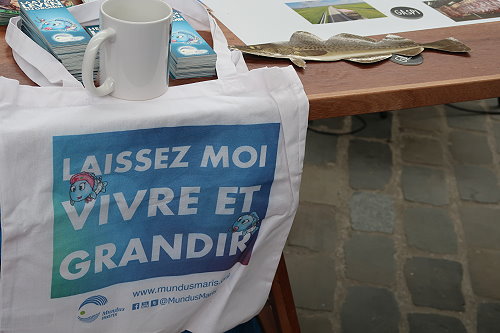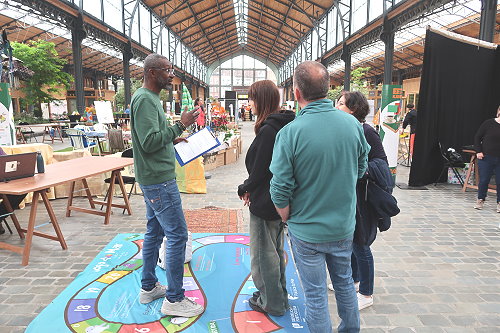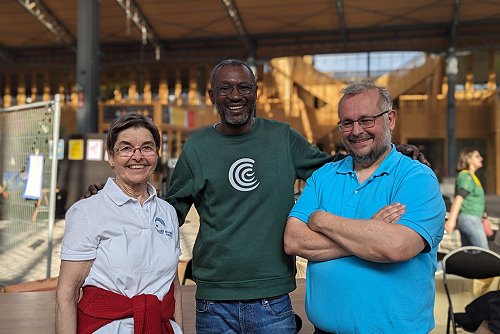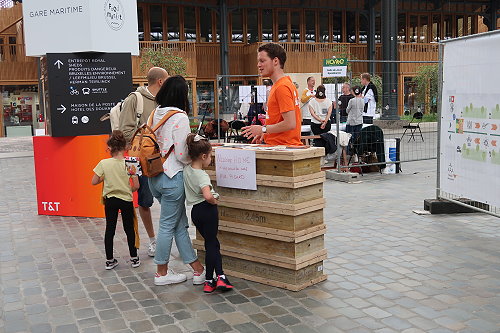 Entirely organised by citizen volunteers with the support of businesses or organisations acting on a voluntary basis, the H.O.M.E event at the Tour and Taxis maritime station welcomed families and other visitors the weekend of May 25 and 26, 2024. H.O.M.E. stands for House Of Mother Earth and is an initiative of the non-profit Climattitude. Our friends of COREN and Mundus maris asbl were invited to provide animation for the ‘kitchen’, one of the many rooms of the home in the spacious and well restored Gare maritime. What better to propose than protecting baby fish to let them grow and reproduce for healthy food for ever!
Entirely organised by citizen volunteers with the support of businesses or organisations acting on a voluntary basis, the H.O.M.E event at the Tour and Taxis maritime station welcomed families and other visitors the weekend of May 25 and 26, 2024. H.O.M.E. stands for House Of Mother Earth and is an initiative of the non-profit Climattitude. Our friends of COREN and Mundus maris asbl were invited to provide animation for the ‘kitchen’, one of the many rooms of the home in the spacious and well restored Gare maritime. What better to propose than protecting baby fish to let them grow and reproduce for healthy food for ever!
The idea of the event was to offer different types of activities to visitors going from ‘room to room’ in the emblematic building that now serves a mix of business, cultural events and leisure. Entry was free and the entire setting in simple second hand furniture and rugs borrowed from ‘Petits Riens’ contrasted starkly with the stately venue. Each room offered animation relating to its purpose in the house. In addition, visitors could participate in workshops, such as extensive round-table conversations around the ‘fresques’ concept, e.g. developing together a better understanding about such topics as the circular economy, what the ocean means to humanity and several others.

Thierno Ndiaye of COREN turned out to be a very engaging animator for the Ocean Game Mundus maris had brought for the event
Our contribution was the ocean game that allowed players in a fun mode to test their knowledge about the ocean and the way humans interfere with marine ecosystems. The awards in the form of Mundus maris book marks and marine sweets were popular among all age groups. We also promoted the FishBase Guide app to make it easier for citizens to know the minimum reproductive size of the fish they are interested in – length and weight. Smaller fish than that should not be caught to sustain the population into the future. The app also gives the maximum size recorded for the species in question and the optimum size which would produce maximum catches for ever! The data come from the FishBase, the information system on all fish known to science.
The app will work in any country. It generated interest even among some vegan visitors, who don’t consume fish, but would like to contribute to reducing human pressures on marine and terrestrial ecosystems.

The COREN and Mundus maris team
For those not familiar with the history of what is now the Gare maritime, let’s recall that at the end of the 19th century, the advent of the port of Brussels went hand in hand with the development of new railway facilities.
In 1910, King Leopold II of Belgium inaugurated a complex consisting of a maritime terminal with customs services and a royal warehouse for the storage of goods received or to be shipped. Less than a century later, the dominance of truck transport, containers and the blurring of intra-European borders made these installations obsolete.
Not only did the magnificent Railway terminal building need to be repurposed after restoration, but the four hectares of rail tracks outside offered a great opportunity for redevelopment of the city of Brussels.

One of the welcome desks at each side of the station
So, opening the space to the creativity of non-profit organisations and inviting visiting citizens to engage was an excellent way to diversify the use and the users. The publicity of the organisers had not reached that far in the busy event calendar in Brussels, but the relaxed and friendly atmosphere allowed for good conversations and substantive exchange with visitors from very different walks of life and other non-profits. So the time flew by and before we knew it, it was time to pack up at the end of the day. We have already been asked to be on board again next year and happily agreed after this nice experience. We can only hope that more people learn about HOME in 2025 and enjoy it. Photos by CE Nauen of Mundus maris.
